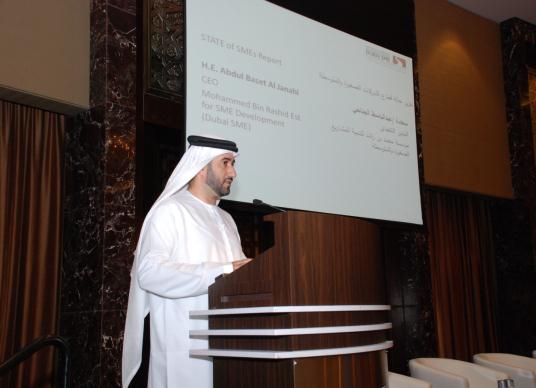
Dubai SME, the agency of the Department of Economic Development (DED) mandated to develop the small and medium enterprise (SME) sector, has released a comprehensive report on the state of the Dubai SME sector covering the si ze, composition, profile and characteristics of SMEs.
The first-of-its-kind report follows a survey of 500 SMEs across varied sectors, financial analyses of over 300 SMEs as well as interviews, and it comprises a detailed analysis of the economic relevance and business performance of SMEs, based on Dubai’s official SME definition.
Aimed to provide a multi-dimensional overview of the SME sector in Dubai, the report will help people working in the realms of policy, human resource development, technology solutions, corporate governance strategies, banking and financial services to evaluate the prevailing trends and needs in the sector, and respond accordingly.
“A report on the state of SMEs in Dubai is essential to enabling this vital sector attract due attention and achieve the goals envisioned for this sector. Having pioneered an official SME definition the natural next step for Dubai is indeed to highlight the potential and gaps in the sector for appropriate action by all concerned,” says Sami Al Qamzi, director general of DED.
Underlining the role of SMEs in economic activity, job creation and promoting innovations Al Qamzi adds that while 95% of the establishments in Dubai are SMEs, 72% among them are micro enterprises, which shows their significance in nurturing entrepreneurial start-ups and new business models.
“The total contribution of SMEs to Dubai’s gross domestic product (GDP) stands at 40% and these enterprises are a growing presence in sectors that drive growth in Dubai. Sector-wise, trading SMEs account for 47% of the total GDP contribution with services and manufacturing following with 41% and 13%, respectively,” says Al Qamzi.
Abdul Baset Al Janahi, CEO of Dubai SME, says the report will serve as a reference for all stakeholders in economic development at the federal and local levels besides providing strategic inputs for the five-year strategic plan of Dubai SME, which is in the pipeline.
“The report brings valuable insights – it shows that the SME sector in Dubai is critical to the emirate’s economic dynamism and has immense opportunities for future; it also shows there is room for improvement at the individual SME level, especially in terms of competitiveness and investment in human resources, innovations and transparency, to name a few,” says Al Janahi.
The report reveals that 57% of the SMEs operate in trading while 35% are involved in the services sector. However, service firms are the leading SME employers with 51% of the workforce, followed by the trading sector which comes second with 33%. The manufacturing sector, too, shows strong prospects with 16% of the workforce.
Human resource consultants as well as training firms and information technology (IT) firms have significant opportunities in the local SME sector as focus on efficiencies and adoption of IT solutions is apparently insufficient, often leading to low SME productivity.
The report says the productivity per person (PPP) among Dubai SMEs is $30,500, lower than in other trading and service-oriented economies like Singapore ($106,600) and South Korea ($58,300). Only 21% of the SMEs use advanced IT systems, and 25% have dedicated staff or units for employee welfare. But 72% of the SMEs said they evaluate and reward employee performance on a regular basis.
Comparatively low debt obligations help SMEs in Dubai’s manufacturing sector to have gross margin ratios of 30-40% of their net revenues while the highest margin ratio for services firms is 10-22%, and that for trading firms is 10-14%.
The survey also shows a high export orientation among local SMEs as 51% of them draw some part of their revenues from regional and international markets. Moreover, 60% of Dubai SMEs have more than 20% of their sales revenues provided by export markets.
Even though they have an inherent capacity to drive innovations, SMEs in Dubai score low in terms of dedicated budgets for research and development. Overall 13% of the survey respondents said they have implemented some kind of innovation with the share rising up to 29% among manufacturing companies.
Manufacturing SMEs have comparatively higher orientation to corporate governance in Dubai as 26% of them have a formal organisation structure or audited financial statements, as against 18% services firms and 14% trading companies. Exposure to external financing among local SMEs remains low and personal wealth remains the major source of capital. Only 10% of the SMEs said they have accessed long-term capital financing.
The scalability potential of local SMEs also remains at a low level, with 77% already running to 50% capacity. Only 19% said they are favourably placed to expand as cost remains a limiting factor even when they see growth opportunities.